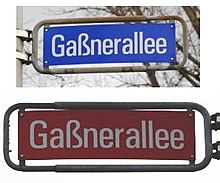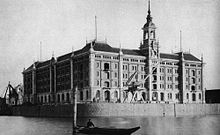Heinrich Gassner

Dr. Heinrich Gassner (born June 8, 1847 in Mainz ; † September 9, 1905 there ) was Mayor of Mainz from February 24, 1894 until his death, and from June 15, 1894 also Lord Mayor.
Life
Gassner was born the son of the notary Heinrich Gassner and the singer Anna Maria Seeland. In 1874 he married Therese Reuleaux (* 1852 † 1932). Therese came from a well-known family of manufacturers, she was the niece of Franz Reuleaux . She was the daughter of Ludwig Reuleaux .
Heinrich Gassner attended grammar school in Kronberger Hof. After graduation, he studied law in Giessen and Heidelberg, where he also received his doctorate. He had been a public prosecutor in Mainz since June 18, 1879. On September 23, 1885, he became the first salaried councilor and thus also the mayor's representative. After the age-related retirement of Dr. Oechsners in 1894, Gassner was elected mayor. Even at this point in time, Gassner was so popular with the Mainz population that a torchlight procession was held in the flagged streets of Mainz for his mayoral election. Gassner restructured the city administration. He appointed full-time councilors and formed specialist departments. So were z. B. the city building department is divided into four departments: building construction, civil engineering, mechanical engineering and building police. During his tenure, important steps were taken to improve the housing situation of the lower classes. He also fought for the city to expand to the west. The school system was also expanded considerably with the construction of six elementary schools. This took into account the population growth. He also began negotiations for the incorporation of surrounding villages. Dr. Heinrich Gassner died on September 9, 1905 of a serious heart condition. He is buried in the main cemetery in Mainz . The Gaßnerallee in Mainz-Neustadt has been named after him since 1906 .
Honors
Gassner was Commander of the Grand Ducal Hessian Order of Merit II. Class with the Crown, Knight of the Royal Prussian Red Eagle Order II. Class, Knight of the Royal Prussian Crown Order II. Class, Knight of the Imperial Russian Order of St. Stanislaus II. Class, Owner of the Grand Ducal Hessian Military Medical cross and holder of other awards.
Cultural worker
Heinrich Gassner wrote regular theater reviews for the Mainzer Tagblatt while he was working for the public prosecutor's office . Through a contract between the city administration and the theater management , he ensured that the theater critics were given selected seats. He pursued his literary inclination by writing a work on the history of the Mainz fortress . Gassner was president of the Mainz Liedertafel for several years and also participated as an active baritone singer in this association.
Events during his tenure
- 1894, Bonifatiuskirche , construction of a five-storey warehouse in the customs and inland port of Mainz , XI. German federal shooting, Schützenbrunnen, demolition of the new gate
- 1896, women's work school, Feldberg school on Feldbergplatz , removal of the Gautor , establishment of the butcher's trade association
- 1897, employment office
- 1898, wash bridge, slaughterhouse and cattle yard
- 1899, Mainz Carneval Club , gas and electricity works , removal of the castle barracks and the flour store on Flachsmarktstrasse , planning of a new city center between the old town and new town as part of an urban development competition with the Deutschhausplatz , Ernst-Ludwig-Platz and Schlossplatz
- 1900, 500th birthday of Johannes Gutenberg
- Nuremberg Rally of the Social Democratic Party
- 1901, Gutenberg Museum , New Provision Office
- 1903, crematorium , Christ Church
- 1904, 2nd city expansion , Baentschstraße settlement , electric tram , Kaiserbrücke
- The Mainz fortress was abandoned on March 18, 1904
- 1905, foundation of the soccer club 1. FSV Mainz 05 , Leibniz School
- First German commercial court
Web links
- Gassner, Heinrich. Hessian biography. (As of August 13, 2019). In: Landesgeschichtliches Informationssystem Hessen (LAGIS).
- Entry on Heinrich Gassner in the Rhineland-Palatinate personal database
Individual evidence
- ↑ Western Europe Vital Records Index (see http://wiki.genealogy.net/wiki/WEVRI )
- ↑ a b grave in the main cemetery in Mainz
- ↑ http://www.seiflow.co.uk (April 2, 2007)
- ↑ a b Balzer, W., Mainz - personalities of the city's history, Volume I, honorary citizens, church princes, military, mayors, Kügler Ingelheim 1985, ISBN 3-924124-01-9
- ^ Wilhelm Huber: Das Mainz-Lexikon - 3600 key words on the city, history, culture, personalities, Verlag Hermann Schmidt Mainz 2002, ISBN 3-87439-600-2
- ^ The Mainz town hall ; Bruno Funk, Wilhelm Jung ; Self-published by the Mainz city council, publishing house in Mainz and Will & Rothe printing works in 1974
| personal data | |
|---|---|
| SURNAME | Gassner, Heinrich |
| BRIEF DESCRIPTION | Lord Mayor of Mainz |
| DATE OF BIRTH | June 8, 1847 |
| PLACE OF BIRTH | Mainz |
| DATE OF DEATH | September 9, 1905 |
| Place of death | Mainz |



